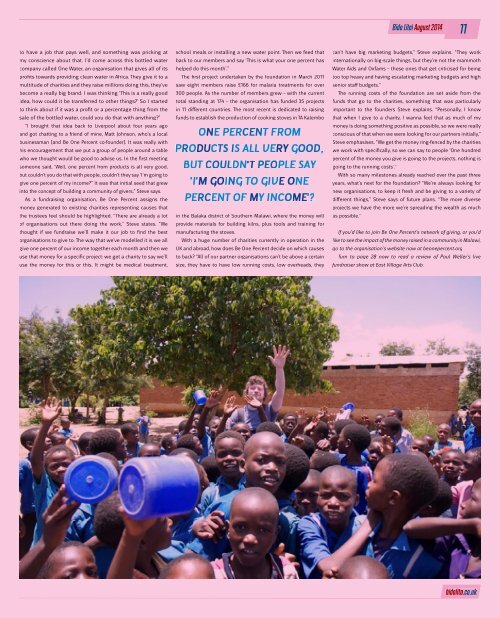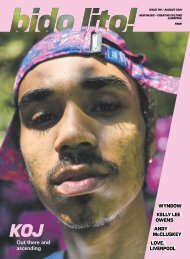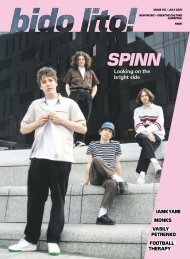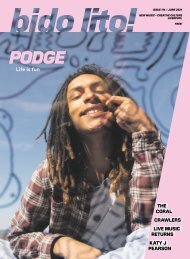Issue 47 / August 2014
August 2014 issue of Bido Lito! Featuring SUNSTACK JONES, AFTERNAUT, MUTANT VINYL, ST. VINCENT, BE ONE PERCENT, BETWEEN THE BORDERS, ADRIAN HENRI, LIVERPOOL BIENNIAL 2014 and much more.
August 2014 issue of Bido Lito! Featuring SUNSTACK JONES, AFTERNAUT, MUTANT VINYL, ST. VINCENT, BE ONE PERCENT, BETWEEN THE BORDERS, ADRIAN HENRI, LIVERPOOL BIENNIAL 2014 and much more.
Create successful ePaper yourself
Turn your PDF publications into a flip-book with our unique Google optimized e-Paper software.
Bido Lito! <strong>August</strong> <strong>2014</strong> 11<br />
to have a job that pays well, and something was pricking at<br />
my conscience about that. I’d come across this bottled water<br />
company called One Water, an organisation that gives all of its<br />
profits towards providing clean water in Africa. They give it to a<br />
multitude of charities and they raise millions doing this, they’ve<br />
become a really big brand. I was thinking ‘This is a really good<br />
idea, how could it be transferred to other things?’ So I started<br />
to think about if it was a profit or a percentage thing from the<br />
sale of the bottled water, could you do that with anything?”<br />
“I brought that idea back to Liverpool about four years ago<br />
and got chatting to a friend of mine, Matt Johnson, who’s a local<br />
businessman [and Be One Percent co-founder]. It was really with<br />
his encouragement that we put a group of people around a table<br />
who we thought would be good to advise us. In the first meeting<br />
someone said, ‘Well, one percent from products is all very good,<br />
but couldn’t you do that with people, couldn’t they say ‘I’m going to<br />
give one percent of my income?’’ It was that initial seed that grew<br />
into the concept of building a community of givers,” Steve says.<br />
As a fundraising organisation, Be One Percent assigns the<br />
money generated to existing charities representing causes that<br />
the trustees feel should be highlighted. “There are already a lot<br />
of organisations out there doing the work,” Steve states. “We<br />
thought if we fundraise we’ll make it our job to find the best<br />
organisations to give to. The way that we’ve modelled it is we all<br />
give one percent of our income together each month and then we<br />
use that money for a specific project: we get a charity to say we’ll<br />
use the money for this or this. It might be medical treatment,<br />
school meals or installing a new water point. Then we feed that<br />
back to our members and say ‘This is what your one percent has<br />
helped do this month’.”<br />
The first project undertaken by the foundation in March 2011<br />
saw eight members raise £166 for malaria treatments for over<br />
300 people. As the number of members grew – with the current<br />
total standing at 174 – the organisation has funded 35 projects<br />
in 11 different countries. The most recent is dedicated to raising<br />
funds to establish the production of cooking stoves in TA Kalembo<br />
ONE PERCENT FROM<br />
PRODUCTS IS ALL VERY GOOD,<br />
BUT COULDN'T PEOPLE PLE SAY<br />
'I'M GOING TO GIVE ONE<br />
PERCENT ENT OF MY INCOME'?<br />
in the Balaka district of Southern Malawi, where the money will<br />
provide materials for building kilns, plus tools and training for<br />
manufacturing the stoves.<br />
With a huge number of charities currently in operation in the<br />
UK and abroad, how does Be One Percent decide on which causes<br />
to back? “All of our partner organisations can’t be above a certain<br />
size, they have to have low running costs, low overheads, they<br />
can’t have big marketing budgets,” Steve explains. “They work<br />
internationally on big-scale things, but they’re not the mammoth<br />
Water Aids and Oxfams – those ones that get criticised for being<br />
too top heavy and having escalating marketing budgets and high<br />
senior staff budgets.”<br />
The running costs of the foundation are set aside from the<br />
funds that go to the charities, something that was particularly<br />
important to the founders Steve explains. “Personally, I know<br />
that when I give to a charity, I wanna feel that as much of my<br />
money is doing something positive as possible, so we were really<br />
conscious of that when we were looking for our partners initially,”<br />
Steve emphasises. “We get the money ring-fenced by the charities<br />
we work with specifically, so we can say to people ‘One hundred<br />
percent of the money you give is going to the projects, nothing is<br />
going to the running costs’.”<br />
With so many milestones already reached over the past three<br />
years, what’s next for the foundation? “We’re always looking for<br />
new organisations, to keep it fresh and be giving to a variety of<br />
different things,” Steve says of future plans. “The more diverse<br />
projects we have the more we’re spreading the wealth as much<br />
as possible.”<br />
If you’d like to join Be One Percent’s network of giving, or you’d<br />
like to see the impact of the money raised in a community in Malawi,<br />
go to the organisation’s website now at beonepercent.org<br />
Turn to page 28 now to read a review of Paul Weller’s live<br />
fundraiser show at East Village Arts Club.<br />
bidolito.co.uk


















